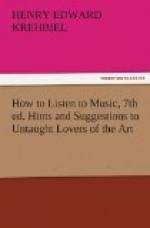Bach is the publisher of the truest, tenderest, deepest, and most individual religious feeling. His music is peculiarly a hymning of the religious sentiment of Protestant Germany, where salvation is to be wrought out with fear and trembling by each individual through faith and works rather than the agency of even a divinely constituted Church. It reflects, with rare fidelity and clearness, the essential qualities of the German people—their warm sympathy, profound compassion, fervent love, and sturdy faith. As the Church fell into the background and the individual came to the fore, religious music took on the dramatic character which we find in the “Passion Music” of Bach. Here the sufferings and death of the Saviour, none the less an ineffable mystery, are depicted as the most poignant experience of each individual believer, and with an ingenuousness that must forever provoke the wonder of those who are unable to enter into the German nature. The worshippers do not hesitate to say: “My Jesus, good-night!” as they gather in fancy around His tomb and invoke sweet rest for His weary limbs. The difference between such a proclamation and the calm voice of the Church should be borne in mind when comparing the music of Palestrina with that of Bach; also the vast strides made by music during the intervening century.
[Sidenote: The motet.]
Of Bach’s music we have in the repertories of our best choral societies a number of motets, church cantatas, a setting of the “Magnificat,” and the great mass in B minor. The term Motet lacks somewhat of definiteness of the usage of composers. Originally it seems likely that it was a secular composition which the Netherland composers enlisted in the service of the Church by adapting it to Biblical and other religious texts. Then it was always unaccompanied. In the later Protestant motets the chorale came to play a great part; the various stanzas of a hymn were given different settings, the foundation of each being the hymn tune. These were interspersed with independent pieces, based on Biblical words.
[Sidenote: Church cantatas.]
The Church Cantatas (Kirchencantaten) are larger services with orchestral accompaniment, which were written to conform to the various religious festivals and Sundays of the year; each has for a fundamental subject the theme which is proper to the day. Again, a chorale provides the musical foundation. Words and melody are retained, but between the stanzas occur recitatives and metrical airs, or ariosos, for solo voices in the nature of commentaries or reflections on the sentiment of the hymn or the gospel lesson for the day.
[Sidenote: The “Passions."]
[Sidenote: Origin of the “Passions."]
[Sidenote: Early Holy Week services.]




